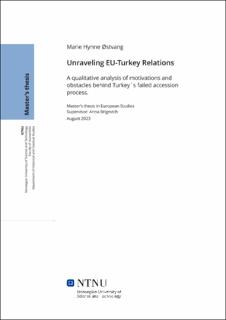| dc.contributor.advisor | Brigevich, Anna | |
| dc.contributor.author | Østvang, Marie Hynne | |
| dc.date.accessioned | 2024-01-18T18:19:50Z | |
| dc.date.available | 2024-01-18T18:19:50Z | |
| dc.date.issued | 2023 | |
| dc.identifier | no.ntnu:inspera:144932901:23055590 | |
| dc.identifier.uri | https://hdl.handle.net/11250/3112625 | |
| dc.description.abstract | I 2018 avsluttet den Europeiske Union (EU) forhandlingsprosessen med Tyrkia om å bli medlem av unionen. Denne avgjørelsen kom til tross for at Tyrkia har vært EU´s lengst stående kandidatland og deres kontinuerlige løfter om tyrkisk medlemskap. Forholdet mellom EU og Tyrkia har utviklet seg til et av de mest kompliserte i nyere historie, og denne masteroppgaven undersøker årsakene til dette ved å redegjøre for det stadig turbulente forholdet mellom de to aktørene.
I redegjørelsen av dette forholdet tar oppgaven for seg to formål. Først undersøkes det for hva som har motivert begge parters utenrikspolitikk ovenfor hverandre ved å anvende tre logikker for politisk handling: «Logic of Consequences» (handling etter konsekvenser), «Logic of Appropriateness» (handling etter forventet oppførsel), og «Logic of Moral Justification» (handling etter moralsk aksepterte prinsipper). Ved å gjøre det gir oppgaven et verdifult bidrag til eksisterende litteratur ved at den tester de tre logikkenes forklaringskraft til andre nasjoner når de tidligere har blitt brukt hovedsakelig i sammenheng med utvidelsen av EU. Oppgaven konkluderer med at bare to av logikkene, Logic of Consequences og Logic of Appropriateness, har forklaringskraft, og gir dermed sitt andre bidrag til – argumentet for at Logic of Moral Justification ikke er relevant i definisjonen av EU-Tyrkia forholdet. Oppgavens andre formål er å undersøke hovedfaktorene som forklarer hvorfor Tyrkia ikke har blitt medlem av EU, og konkluderer med at problemer med menneskerettigheter og demokrati, situasjonen på Kypros, og kulturforskjeller har den største forklaringsmakten.
For å oppnå disse formålene vil oppgaven gjennomføre en kvalitativ casestudieanalyse med elementer av prosessporing, ettersom oppgaven tar sikte på å forstå det historiske forholdet mellom EU og Tyrkia fra 1950-tallet til forhandlingsprosessens slutt i 2018. | |
| dc.description.abstract | In 2018, The European Union (EU) stopped negotiations in Turkey´s accession process to join the union. This decision came despite Turkey being the EU´s longest-standing candidate country and continuous promises of Turkish accession. Their relationship has become one of the most complicated in recent history, and the thesis aims to examine the causes by asking how we can account for the continually turbulent relationship between the two actors.
To account for the relationship, the thesis aims to address two objectives. Firstly, it investigates what has motivated both parties in their foreign policy towards each other by utilising three logics of political action: The Logic of Consequences (acting according to expected utility), the Logic of Appropriateness (acting according to appropriate behaviour), and the Logic of Moral Justification (acting according to morally accepted principles). In doing so, the thesis provides a valuable contribution to the existing literature. It tests the three logics explanatory power to other nations when they have previously been used mainly in the context of EU enlargement. Concluding that only two logics, the Logic of Consequences and the Logic of Appropriateness, have explanatory power, the thesis makes its second contribution – arguing that the Logic of Moral Justification is irrelevant in defining the EU-Turkey relationship. The second objective is to examine the main factors explaining the failure of Turkey to join the EU, concluding that human rights and democracy, the situation in Cyprus, and cultural clashes hold the most explanatory power.
To address these objectives, the thesis will conduct a qualitative case study analysis with elements of process tracing, as the thesis aims to understand the historical trajectory of the EU-Turkey relationship from the 1950s until Turkish accession negotiations ended in 2018. | |
| dc.language | eng | |
| dc.publisher | NTNU | |
| dc.title | Unraveling EU-Turkey Relations: A qualitative analysis of motivations and obstacles behind Turkey´s failed accession process. | |
| dc.type | Master thesis | |
